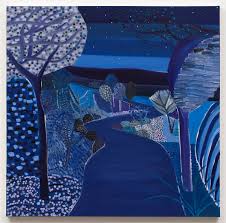
The word means good time and constitutes euphemism for the night. Thus, in Hesiod we read μακραὶ γὰρ καὶ ἐπίρροθοι εὐφρόναι εἰσί. That is, the nights are long and allies. Hesiod sees in the long nights a helper and protector. Darkness provides its own security. And Proclus adds that the night helps the oxen, because they rest a lot and do little. So, the darkness offers them rest from the activities of the day. The ἄστρων εὐφρόνη is the starry night, while the genitive εὐφρόνης means during the night.
Later writers, such as Isichios, use the word to mean as ευφροσύνη, meaning calm and deep joy.
The word has the root φρεν– (fren-), which is found in the word φρήν (gen. φρενός, pl. φρένες), which signifies the mind, the brain, the intellect, and the logic. Some people think that the word εὑφρόνη is an abbreviated form of the word εὐφροσύνη.
It is worth to think that a word related to wisdom, logic and the mind ends up being associated with the night, the pre-eminent time of folly and irrationality, of darkness, which leaves speech on the sidelines. The ancient Greeks, then, praised night or wisdom, mixing the two opposing worlds. After all, in the world of unity, the opposites are abolished.
Finally, we can remember some of the mysterious phrases of Heraclitus, which include the word εὐφρόνη:
ἄνθρωπος ἐν εὐφρόνῃ φάος ἅπτεται ἑωυτῷ ἀποσβεσθεὶς ὄψεις. ζῶν δὲ ἅπτεται τεθνεῶτος εὕδων, ἐγρηγορὼς ἅπτεται εὕδοντος [fragment Β26].
Translation: When his eyes are closed (being dead), man turns on light in the night for himself. The living touches his death (the dead, if we follow the translation faithfully); when he sleeps (when his eyes are closed); when he is awake, he touches the sleep (the asleep, faithfully following the translation).
This passage has provoked much debate. It follows a cycle of reasoning, to reveal perhaps a profound truth about our lives: when we are awake, we are actually asleep because we do not realize our ignorance. When we are alive, we can touch death symbolically or literally, because for us it is a limit and a guide, to really see and understand our situation. When we die, we can turn on a light in the night, to realize the truth, because we complete the cycle of existence. However, we spend most of our time ἐν εὐφρόνῃ [in the darkness of the night].
διδάσκαλος δὲ πλείστων Ἡσίοδος· τοῦτον ἐπὶστανται πλεῖστα εἰδέναι, ὅστις ἡμέρην καὶ εὐφρόνην οὐκ ἐγίνωσκεν· ἔστι γὰρ ἕν. [fragment Β57]
Translation: Hesiod is the teacher of most people; they know very well that he knows a lot o things; he who doesn’t know the difference between day and night; for they are one.
In this phrase Heraclitus summarizes all the poetic wisdom of Hesiod. Truly, night and day, darkness and light are one. Everything is insoluble from the other and cannot exist without its opposite.
ὁ θεὸς ἡμέρη εὐφρόνη, χειμὼν θέρος, πόλεμος εἰρήνη, κόρος λιμός. ἀλλοιοῦται δὲ ὅκωσπερ πῦρ, ὁπόταν συμμιγῇ θυώμασιν, ὀνομάζεται καθ᾽ ἡδονὴν ἑκάστου [fragmant Β67].
Translation: God is day and night, winter summer, war peace, satiety hunger. It changes like fire, when mixed with incense, it gets the name that pleases everyone.
This phrase is so complex in its simplicity. God includes everything and takes the name that everyone wants to give it, without changing its essence. As fire transforms incense, but retains and highlights the substance through the union of opposites that are complemented.
εἰ μὴ ἥλιος ἦν, ἕνεκα τῶν ἄλλων ἄστρων εὐφρόνη ἂν ἦν [fragment Β99]
Translation: If there were no sun, it would be night as much as it [the light] depends on the other stars.
In this short fragment we learn two things. Heraclitus treats the sun as a star, since it separates it from “the other stars”. The second thing we understand is that he considers the sun to be a true illuminator, while the other stars are heterogeneous and incapable of illuminating the darkness. Symbolically, we could see that stars, which are heterogeneous, are not enough to dispel the darkness of ignorance, if there is no true light.
Source:
Liddell, Scott, Jones Ancient Greek Lexicon (LSJ), λήμμα ευφρόνη και φρηνhttps://lsj.gr/wiki/%CE%B5%E1%BD%90%CF%86%CF%81%CF%8C%CE%BD%CE%B7
Heraclitus, Apanta [All the fragments], Zitros [introduction-translation: Tassos Falkos-Arvanitakis]
Anastasia Karavasileiou


